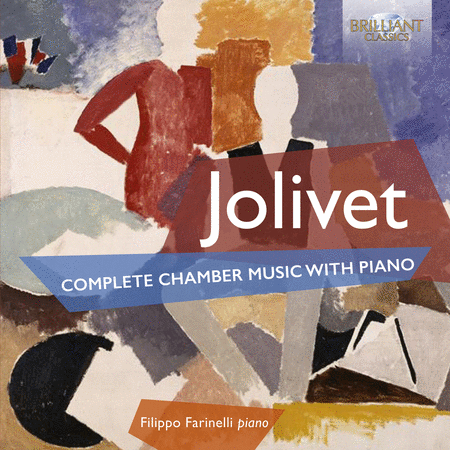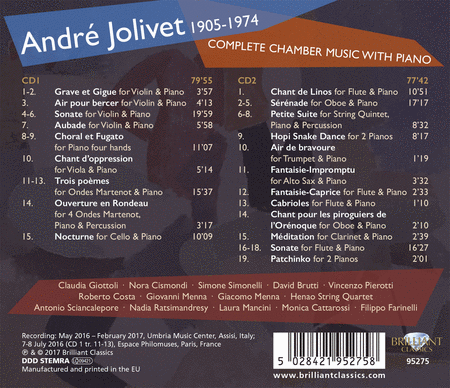Jolivet: Complete Chamber Music with Piano
Details
Description
SKU: NX.BRI95275
By Antonio Sciancalepore, Claudia Giottolo, David Brutti, Filippo Farinelli, Giacomo Menna, Giovanni Menna, Henao String Quartet, Laura Mancini, Monica Cattarossi, Nadia Ratsimandresy, Nora Cismondi, Roberto Costa, Simone Simonelli, and Vincenzo Pierotti. By Andre Jolivet. Classical. CD. Naxos #BRI95275. Published by Naxos (NX.BRI95275).Andre Jolivet (1905-1974) is surely one of the most interesting yet neglected French composers of the last century. Outside the constraints of the Parisian conservatoire tradition, he developed an idiom way ahead of its time compared to many of his contemporaries; indeed, while Edgard Varese was ploughing his furrow, Jolivet was his only European pupil between 1929 and 1933. However, Varese-like acerbity and austerity is out of place here. Jolivet was never less than a skilled melodist, and one who wrote for his chosen instruments rather than against them. Much that is here such as a sensuous Flute Sonata, a muscular Violin Sonata or a jocular Suite for oboe and piano is pitched, to ears unfamiliar with Jolivet, in an idiom somewhere between Poulenc, Messiaen and Dutilleux; but that's the voice of Jolivet, and closer acquaintance with this set will accustom listeners to it in all its unpredictable, quicksilver charm. The Flute Sonata has received several recordings in the company of the likes of Poulenc and Koechlin, but there is much here that will be unfamiliar to even the most dedicated discophiles and followers of French musical fashions: an Ouverture en Rondeau for 4 ondes martenot, piano & percussion, for example, or the Petite Suite for string quintet, piano and percussion. Few of the individual pieces or movements are of any great length - Jolivet knew the value of succinct expression like many French musicians of his generation- but there is a ten-minute Nocturne for cello and piano, and a rhapsodic Chant de Linos for flute and piano of the same length. The later music is especially intriguing, once Jolivet had found for himself a new form of classicism aimed at synthesizing serial and freely atonal music together with modal developments.


 Share
Share